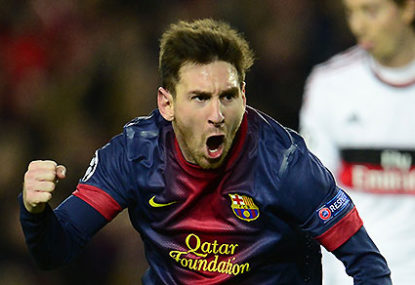On Sunday morning, we were privileged enough to witness the first installment of the 2013/14 season’s El Classico, live from the Camp Nou. And what a spectacle it was.
Barcelona – the team that does football so, so right – outclassed and out-muscled Madrid’s marquees.
But see this fixture is more than just a football match, it’s more than just a match between the two biggest and sparkliest clubs in world football.
This match means so much to the Spanish people, especially those who reside in Catalonia and those who lived under the torturous conditions of Francisco Franco’s tumultuous regime.
There is a saying, you should never mix football and politics, but it’s hard not to when the club and supporters of Catalonia were so heavily strained and affected by the politics of General Franco.
This fixture has enough spite, enough history to be labeled the most politically-spited in world football.
The spite was there as early as the 1930s, when Barcelona developed an ‘us versus them’ mentality.
They began forming themselves as a source of pride and identity for the Catalonia people, as opposed to the centralized tendencies of Real Madrid.
In the 1950s came another spiteful battle, with both clubs trying to sign Alfredo Di Stefano.
Initially he’d been on Madrid’s radar, but Barca snapped him up without permission from his then-club, Millionarios.
However, Madrid had an initial transfer agreement with them.
After a protracted battle, the Spanish FA got both presidents to agree a shared player deal – Di Stefano would play for two years at each club.
This angered the rest of the Barcelona board and caused a protest from the club’s fans, so Barca abandoned the deal and let him go to Madrid two years early.
This transfer piece exacerbated the animosity between these two clubs, which was re-visited with Luis Figo’s switch in 2000.
For a lot of people in Spain and around the footballing world, Barcelona are the rebellious club, while Madrid are the right wing club.
During General Franco’s tenure, the Catalonia people were deprived of their cultural freedom. He ensued there would only be one religion, one language and one cultural way. Anyone who went against that would be punished.
Hence the continued fight for autonomy from the Catalans and other autonomous communities.
Going back to the rivalry, it boiled over in 2011.
The El Classico was played over four times in 18 days (A football fan’s idea of heaven), but for the two Spanish clubs, this became too much.
The 2011 Copa Del Rey final saw years of political history and hatred spilled over.
That season’s rivalry had been so intense and heated, the Spanish coach Vincente Del Bosque had serious concerns the World Champion side would fracture.
I have a Catalonian background, hence my heart will always favour Barcelona, even though I don’t actually support the club.
They not only play beautiful football, but they produce their own crop, rather than steal everybody else’s. Their academy is one of the best in world football.
My favourite footballer of all time, Xavi Hernandez, is the walking ideal of what Barcelona are all about.
And I personally can’t wipe the smile on my face after watching Barca dismantle Madrid.
Neymar was sublime, Xavi/Iniesta were their typical dominant tiki-taka selves. But it was the Chilean Alexis Sanchez who stole the show with a delicious, sublime, mouth-watering goal in the late stages of the match.
This El Classico may not have been as feisty and heated as others, but this fixture is still referred to as the Spanish Civil War.
Long may the heat continue, because it’s not just points that this game ensures, it’s autonomous pride, and a salute to their past fights.





























































































